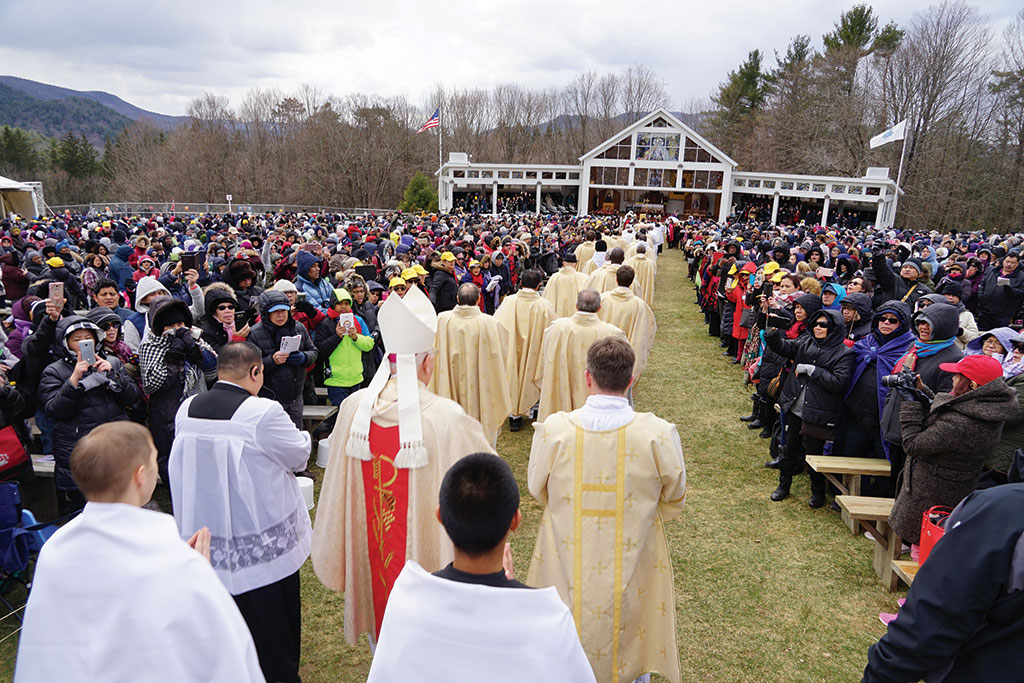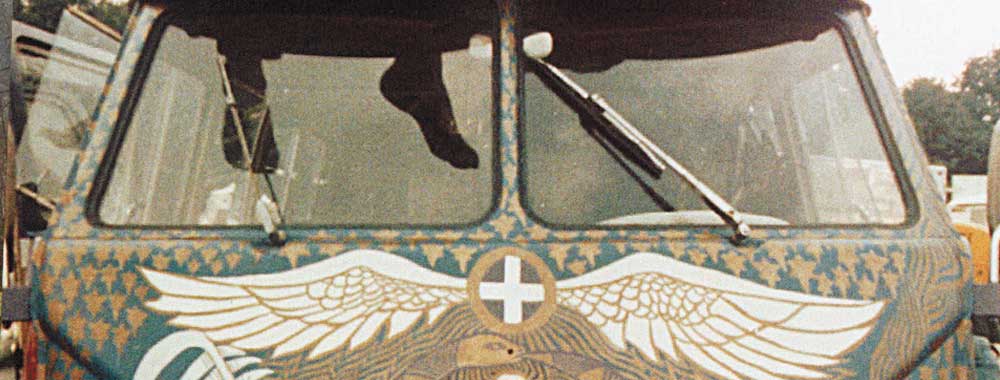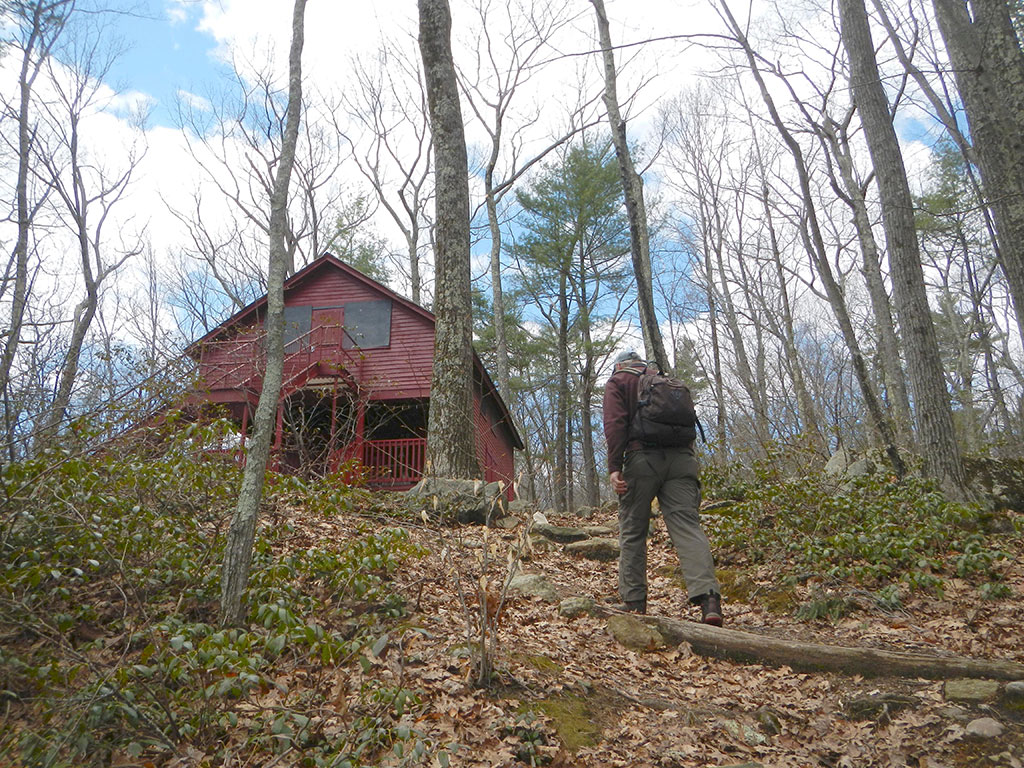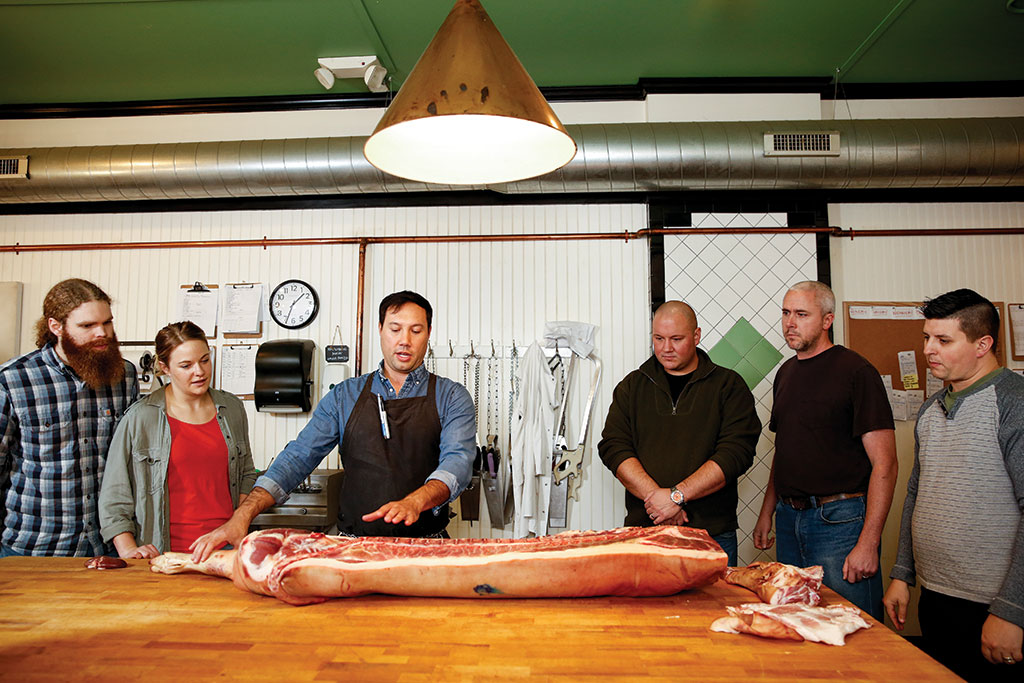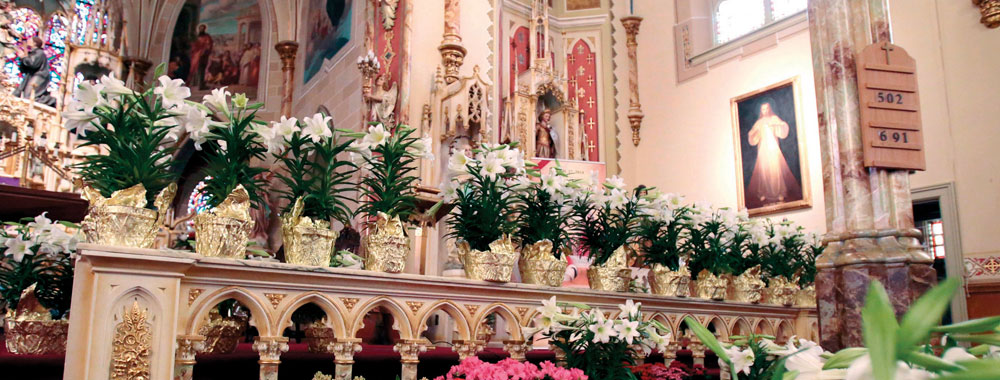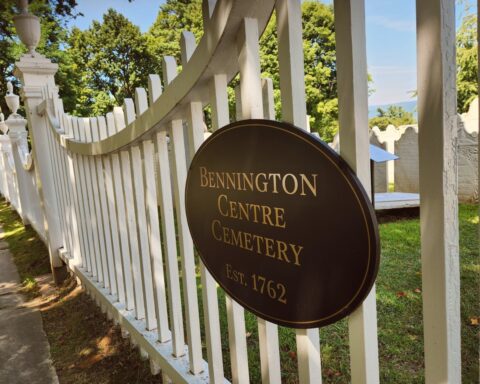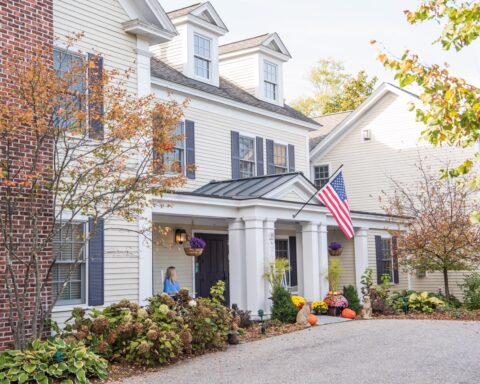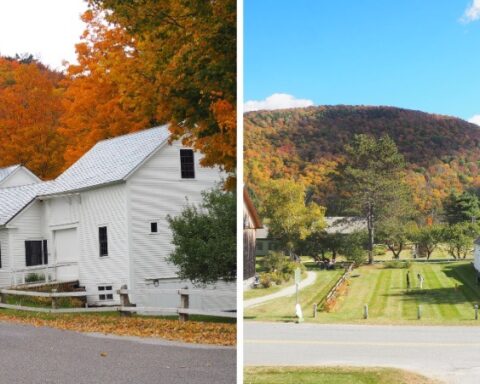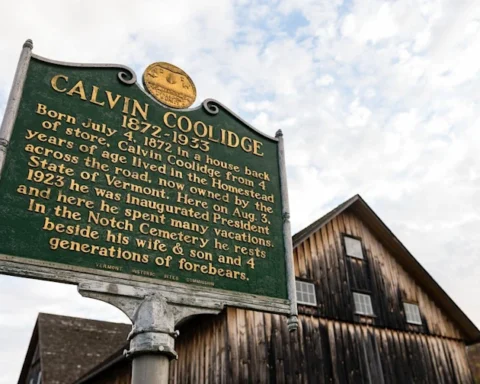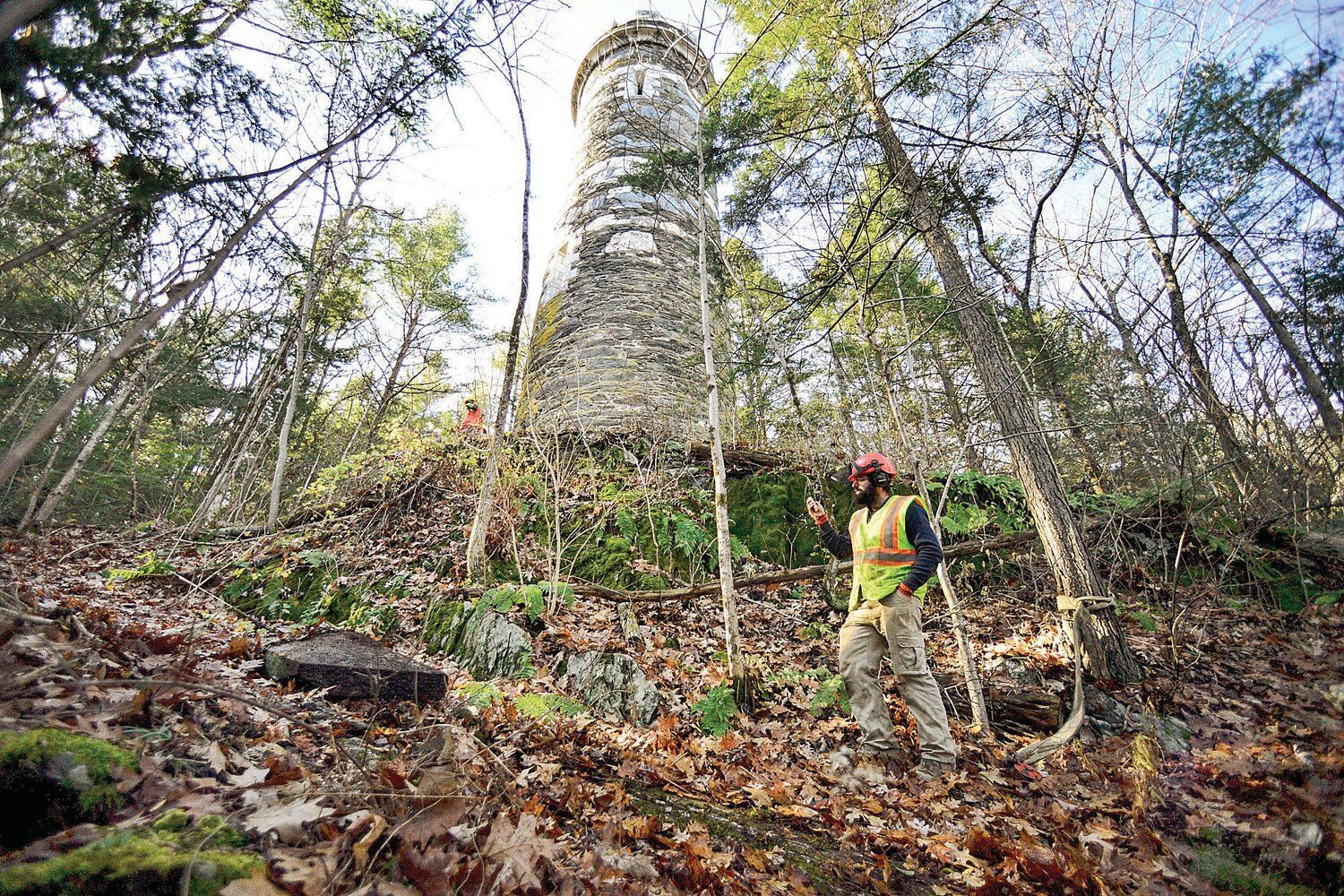Annual pilgrimage brings thousands to National Shrine of The Divine Mercy

By Felix Carroll
As reliable as robins, each spring they come from points throughout North America. By car, by bus, by foot, by the thousands, they make their way up a high point overlooking downtown Stockbridge, Mass., to have a word or two with the Lord.
You might wonder: What in heaven’s name is this all about, anyway? And why in the world Stockbridge?
Fair questions.
The event is Divine Mercy Sunday, a veritable Catholicpalooza of music, worship and celebration.
Held each year at the National Shrine of The Divine Mercy on the Sunday after Easter, this year, on April 28 and hosted by the Marian Fathers of the Immaculate Conception, Divine Mercy Sunday draws upward of 23,000 people seeking to give thanks to God, to ask him for favors, and to pray for this broken-down, messed-up world.
For the 29th year in a row, the event will be broadcast around the world on the Eternal World Television Network (EWTN). No kidding — people in Africa and Asia watch it. Folks in South America and Europe, too.
What exactly is “Divine Mercy”? We begin with a pretty, redheaded farm girl from Poland who had a playful disposition and an extraordinary interior spiritual life that she recorded in a diary in the 1930s.
Her name was Helen Kowalska. She is known today as St. Faustina Kowalska, one of the Catholic Church’s most popular modern saints. She claimed to have conversations with Jesus on the mystery of suffering, redemption and mercy.
Despite having only a couple of years of formal education, she wrote with authority and, after her death in 1938, her diary would eventually speak volumes to even the crankiest, most discerning Catholic theologians. Pope John Paul II canonized her a saint in 2000 and declared that spreading her spiritual revelations — known as the Divine Mercy message and devotion — was the special task of his pontificate. Pope Francis considers her diary required reading.
And the Marian Fathers in Stockbridge happen to be the publishers of said diary, “Divine Mercy in My Soul,” in a whole bunch of languages.

Why the Marians?
Upon Faustina’s death, her spiritual director, the Blessed Father Michael Sopocko, became the de facto bearer of her revelations. With World War II raging — and squeezed between the atheist regimes of the Nazis and Soviets, for whom the Lord’s name was to be used in vain or not at all — Sopocko made perhaps the most consequential handoffs in Catholic history, giving key materials concerning Faustina’s revelations to a Marian priest who was trying to get out of Europe. That priest, the Rev. Joseph Jarzebowski, vowed that if he made it to America, he would promote Divine Mercy for the rest of his life.
After a harrowing journey across Asia, he eventually landed on American shores in May 1941. With the Divine Mercy materials in hand (though not the diary itself; that would come later), he joined his fellow Marian clergymen in Washington. They supported his efforts to spread Faustina’s mystical messages.
By 1944, the Marians’ congregation was growing, and so was its nascent printing ministry. That year, a Marian priest from Adams, Mass., the Rev. Walter Pelczynski, was visiting the Berkshires and scouting for new digs for the Marians when he came upon an old Stockbridge estate named, providentially, Eden Hill. The Marians bought it.
Eden Hill has since become the world epicenter for the spread of Divine Mercy, and Divine Mercy is widely considered the greatest grassroots movement in the history of the Catholic Church. Just put your ear against the wall of the old carriage barn at Eden Hill and you’ll hear the manic ka-plunking of printing presses pumping out pamphlets, prayer cards, magazines, booklets and appeals — some 50 million pieces of literature a year. Eden Hill even has its own ZIP code: 01263.

So, what is meant by “Divine Mercy”? In short, Faustina’s revelations are considered a reassertion of the Gospel message — that God is loving, not vengeful, that he seeks to save, not condemn. Through St. Faustina, God “wants us in the modern world to recognize that his mercy is greater than our sins,” says the Rev. Seraphim Michalenko, a Marian priest also from Adams. “Divine Mercy is a call, an invitation, to turn from sin, ask for God’s mercy and in turn to be merciful to our neighbors.”
Incidentally, Michalenko was the man responsible for ducking behind the Iron Curtain into Poland in the 1970s, clandestinely photographing each page of St. Faustina’s diary and smuggling out the film.
As for Divine Mercy Sunday itself, it’s now a feast day of the entire Catholic Church centered on the theme of forgiveness and the merciful love of God. The reason so many people choose to celebrate the day in Stockbridge is that Eden Hill is home to the National Shrine of The Divine Mercy, built by the Marians in the 1950s, and the spiritual home in North America of St. Faustina’s revelations.
As for all these people who come each year, mostly they’re a joyful lot. Why else would so many of them choose to cram themselves into stuffy tour buses for several hours to worship outdoors in the seasonally schizophrenic weather of April in the Berkshires?
People like Gene Trause, of North Arlington, N.J., who drives eight hours round trip each year with his wife and two daughters.
“This is our check-out-of-the-world, check-into-heaven zone,” he says.
He’ll be here April 28 — God willing.
If you go …
2019 Divine Mercy Sunday Weekend
Saturday, April 27
9 a.m. to 2:45 p.m.: Exposition and Adoration of the Most Blessed Sacrament
10 a.m. to 12:30 p.m.: Mercy Weekend Conference
3 p.m.: Solemn Novena of The Divine Mercy & Benediction at the Mother of Mercy Outdoor Shrine
4 p.m.: Divine Mercy Vigil Mass at the Mother of Mercy Outdoor Shrine
Divine Mercy Sunday, April 28
9 a.m.: Exposition and Adoration of the Most Blessed Sacrament
1 p.m.: Divine Mercy Solemn Liturgy
3 p.m.: Solemn Celebration of the “Hour of Great Mercy”: Novena and Chaplet of The Divine Mercy, Exposition and Benediction of the Most Blessed Sacrament, Blessings of Religious Articles
More information: 413-298-3931, shrineofdivinemercy.org
Felix Carroll is a freelance writer who makes his home with his family in the Berkshires.
